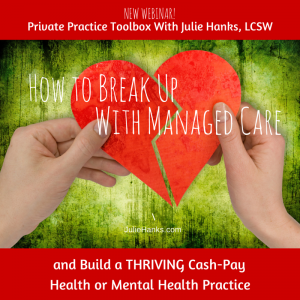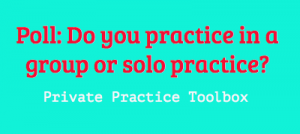 New webinar this Wednesday on building a fee-for-service private practice
New webinar this Wednesday on building a fee-for-service private practice
I've written previously about my decisions to 'break up' with managed care and build a fee-for-service only practice. This topic comes up often in my Private Practice Toolbox Facebook Group. Group members often ask questions like:
- Is it really possible for private practitioners to build a cash-pay practice in our current economy?
- How do you find clients who are willing to pay your full fee at each session?
- How do I overcome the fear of losing all of my clientele if I resign from insurance panels?
- How do you address the needs of those in your community who can't afford your services if you don't work with insurance?
If you've ever wondered these questions, you may be interested in my upcoming webinar this Wednesday.
Date: Wed. Oct 10, 2014*
Time: 11:00 a.m. (PT)/Noon (MT)/1:00 p.m. (CT)/2:00 pm (ET)
Length: 90-minutes
*If you can't make the live webinar at that date & time, no problem! You'll receive a link to watch the replay video at your convenience, but you do need to register.
Here's why I resigned from managed care:
- Excessive paperwork: I was spending almost as much time performing unpaid work (paperwork, phone calls, tracking authorizations, and billing) as I was spending seeing clients. I went into this field to do therapy, not paperwork.
- Reduced income: I resented writing off 40-60% of my fee upfront just to be placed on a list with dozens and dozens of other therapists. The managed care companies weren’t doing anything to market my practice, and yet I was being asked to take a huge pay cut to work with their clients.
- Mandatory diagnosing: I grew tired of having to diagnose every client who walked into my office in order to get paid. When I met with a client who didn’t have clearly diagnosable symptoms, I was faced with a dilemma. Do I stretch a diagnosis just so I can get paid, or do I do free therapy because insurance won’t reimburse without a diagnosis?
- Denied or delayed payments: Being denied reimbursement for a variety of reasons and receiving payment weeks or months after I had performed the service was extremely frustrating.
Here's what has happened since 'breaking up' with managed care:
- Exponential growth: My private practice grew from a solo practice to a clinic of 20 providers and 3 locations in a fee-for-service model during an economic downturn.
- Immediate payments: We get paid our full fee at each session (including late cancellations and no shows)
- Streamlined paperwork: We do assessment, case notes, and discharge summary.
- Motivated clientele: We work with clients who value our time and expertise because they are more financially invested in the therapy process.
- Diagnosis has become a tool, not a requirement for payment: We don't have to diagnose anyone.
In this webinar, I'll show you how to:
- Identify and attract your ideal clients.
- Demonstrate the value of your services to your community through building a strong online and media presence so clients will be willing to pay your full fee at each session.
- Wean off of managed care contracts and smooth this transition for your current clients by offering many options.
- Talk confidently about your services, your fees, and financial policies.
- Provide options for potential clients who can not afford your full fee or who want to use their insurance benefits.
The decision to resign from manage care panels and build a fee-for-service practice is not the right path for every practitioner. However, there are some private practitioners who want to go this direction but lack the knowledge, skills, or confidence to implement their desired changes. If you fall into this second group, this webinar is designed for you.
I hope to see you on Wednesday!
Here's the link to reserve your spot for the webinar and access to the replay video
Oh, and if you have any specific questions you'd like me to address in this upcoming webinar, contact me here with "Managed care webinar Q" in the subject line.




 As a recent private practice consultation group that I was leading came to an end, we took a few minutes to celebrate the growth and successes of each group member. I asked what each group would take away from their consultation group. One therapist turned to me and said, "Thank you for giving me the permission to succeed."
As a recent private practice consultation group that I was leading came to an end, we took a few minutes to celebrate the growth and successes of each group member. I asked what each group would take away from their consultation group. One therapist turned to me and said, "Thank you for giving me the permission to succeed."
As healers, we genuinely like to do our work. Guiding clients through the therapy process and seeing them make progress is why we do what we do. But if you're in private practice, you know there's a lot going on in the back end and that it's crucial to run an efficient and organized business.